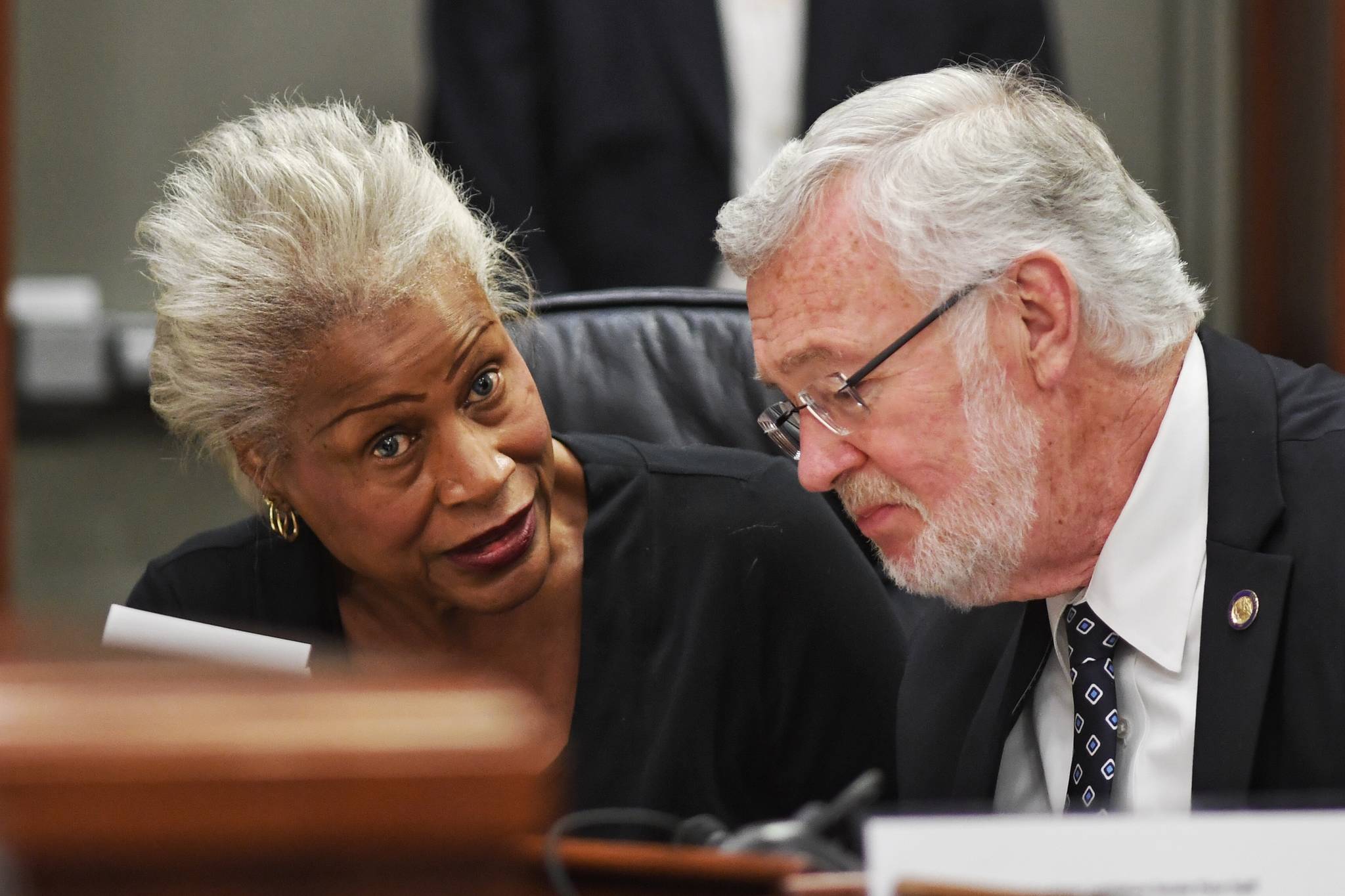The Alaska Legislature approved the smallest state budget in more than a decade, and there’s still a chance that the governor could ask lawmakers to take more from it.
By a unanimous vote of the Alaska Senate on Monday, the Legislature’s budget went to Gov. Mike Dunleavy’s desk for final approval. Sen. Bert Stedman, R-Sitka, told media members Monday that he expects the governor will sign off on the budget as a whole, but could use his veto power to reject portions of the budget.
The state must finalize a budget by the end of the fiscal year June 30 to avoid a government shutdown July 1.
The $4.4 billion budget is $190 million lower than last year’s budget, according to a release from the Senate Majority. That’s about a billion dollars less than Dunleavy’s proposed cuts.
Among the major cuts is a sizable one to the Alaska Marine Highway System — about a $40 million reduction that will cut service down this winter. The budget also cuts more than $100 million from the Department of Health and Social Services, Stedman said on the floor Monday.
[Deep ferry cuts on verge of going through]
Stedman said that Dunleavy might cut more from the Department of Health and Social Services budget, but was going to wait and see what eventually does come from the governor. He joked that he hoped the governor might throw in a little extra money for ferries.
“I’d like him to add to the marine highway, but he can’t add,” Stedman said, his mustache arching upward as he smirked.
Senate dodges vote on dividend amount
The budget does not include a Permanent Fund Dividend, which has been the biggest sticking point of the session for legislators.
Last week, the Senate was just one vote short of approving a $3,000 PFD in the budget. Ten senators voted for the full dividend, when 11 votes were needed. Sen. Mike Shower, R-Wasilla, would have been that 11th vote if he had been there. But Shower, who also works as a pilot for FedEx, had used up all of his personal leave from work to stay in Juneau for the 121-day session, he said in an interview Monday. He said he was able to extend his leave even more through part of special session, but said his job might have been in jeopardy if he had taken more time off.
[Opinion: Paying a dividend Alaska can afford]
So he was gone for a few days last week, and the timing worked out where one of those days was for a $3,000 dividend.
“It was almost soul-crushing, to be honest,” Shower said Monday.
Shower acknowledged that the Alaska House — in which the House Majority has repeatedly proposed having a smaller dividend — probably wouldn’t have agreed with a $3,000 dividend, but he was still “beyond frustrated” to have missed a chance to vote for it.
Shower was in attendance Monday, and voted in favor of having a re-vote on the bill (Senate Bill 1002) that included a $3,000 dividend. The vote failed, though, as the Senate was split 10-10. Eleven votes were needed.
Sen. Elvi Gray-Jackson, D-Anchorage, voted in favor of SB 1002 last week. During Monday’s vote, however, Gray-Jackson voted against reconsidering the bill. Gray-Jackson declined an interview request following the floor session.
What’s next?
Stedman said it’s “very, very, very, very unlikely” that the Legislature reaches an agreement on the PFD by the end of this special session, which ends Friday. Shower agreed, saying there just isn’t enough time to draft a new bill, introduce it and have it pass both the House and Senate by Friday.
Sen. Natasha von Imhof, co-chair of the Senate Finance Committee, told reporters Monday that, “I think it’s very important to address the Permanent Fund outside the operating budget, which I think Sen. Stedman was successfully able to do.”
The Alaska House introduced a resolution this week to form a working group that would examine what to do with the Permanent Fund in the long term. After much debate — and by an 11-9 margin — the Senate agreed to form the working group, which will include four members from each body to meet and then make recommendations to the Legislature on how to proceed with a formula or solution to provide a dividend while still maintaining government services.
There is not a timeline on when the group will meet or introduce recommendations. The House has not yet named its members, but Senate President Cathy Giessel appointed Sens. Stedman, Click Bishop, Shelley Hughes and Donny Olson. When the Senate voted on whether to propose a $3,000 dividend, Bishop and Stedman voted no, while Hughes and Olson voted yes.
• Contact reporter Alex McCarthy at amccarthy@juneauempire.com. Follow him on Twitter at @akmccarthy.

